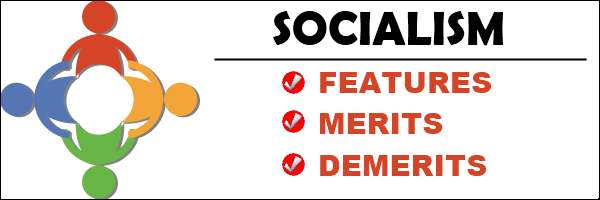Socialism | Features | Merits | Demerits
Socialism is also known as the Communist Economic System or Centrally Planned Economy. It is an alternative to capitalism.

Table of Contents
- 1 Definition of Socialism
- 2 Features of Socialism
- 3 Merits or Advantages of Socialism
- 4 Demerits or disadvantages of Socialism
- 4.1 1. Concentration of Economic and Political Powers in the State
- 4.2 2. Lack of initiative on the Part of People
- 4.3 3. Reduction of overall Productivity
- 4.4 4. Absence of Consumer Sovereignty
- 4.5 5. No Occupational Freedom
- 4.6 6. Bureaucracy and Red-tapism
- 4.7 7. Reduction in efficiency of State enterprise
- 4.8 8. Wastage of resource
- 4.9 9. Administrative burden
- 4.10 10. Loss of liberty
Definition of Socialism
According to Hicks, socialism is
“an economic system in which the means of production are owned and operated by the state for the maximization of social welfare”.
Here property and the means of production are owned, controlled and managed by the state. The Government is authorized to control not only production and distribution, but also consumption.
All economic activities come under the state control in Socialism. Private property does not exist. Every individual has to work to the best of his ability, and the Government takes the responsibility for fulfilling his needs.
In a socialistic system, the resources (factors of production) are owned by the State. The production and distribution of goods will be done for the welfare of the people arid not for the profit of the individuals.
In a socialistic economy, private property will not be allowed and private enterprise will be very little. All factories and firms will be nationalized and production will be done in the public sector. This is just the opposite of capitalism.
This is only a socialism of the general type. There are different forms of socialism. The extreme form of socialism is communism. Karl Mark is the father of this type of socialism.
Features of Socialism
The main features of socialism are as under
1. State ownership
All the factors of production are owned by the State. The government or the community owns the land and factories. There is no private sector.
2. Production and distribution by the State
State produces all goods and services in government factories and farms. It undertakes the distribution of goods to the people by itself.
3. Central Planning and control
There will be a planning authority in Socialism. This authority will decide what to produce, how to produce and for whom to produce. The planning Authority prepares the national plan for utilizing the resources of the economy. Production and distribution will be done accordingly. The price mechanism will be suppressed.
4. Controlled production and consumption
Production of essential commodities will be done first. Production is done not for profit, but for social use. Even if there is any profit, it will go to the State. Mass consumption will not be allowed. Each will be given according to his need.
5. Social Security
The State provides all social security measures such as unemployment benefit, health insurance. etc.
6. Reduction of inequalities
Socialism attempts to reduce the difference between the rich and the peer. It aims at a classless society and eliminates class struggle by giving equal opportunity to work.
In a nutshell, the features of socialism can be listed as below
- No private property.
- Property and means of production are owned and controlled by the State i.e. State ownership.
- Classless society.
- Laborers are supreme and individuals receive no surplus value.
- Each individual has to work to the best of his ability.
- Assurance by the state that it would fulfill the needs of individuals.
- Full employment.
- Equality of opportunity to rise in life.
- Social welfare motive.
- Economic planning.
Merits or Advantages of Socialism
The following are the major merits of socialism:
1. Optimum Utilization of Resources
In Socialism, the resources are owned and controlled by the state in a socialist economy. The central planning authority allocates the resources in the best possible manner. There is no self-interest of private individuals and so no profit motive.
What to produce and how much to produce are decided according to what are really useful to the people. Hence no wastage and duplication take place is socialism.
In short, the resources can be utilized well due to
- central planning;
- absence of private property;
- absence of profit motive and
- production for social use.
2. Equal Opportunity to all
All people get income for the work done by them in the form of salary or wage. Wage structure is so designed that there are no wide inequalities in it. There is equal opportunity for all under this system.
3. Rapid Economic Development
Economic planning is closely associated with socialism. Planning ensures rapid economic development along desired lines.
4. Absence of Trade Cycles
In socialist economy, central planning authority maintains the balance between the forces of demand and supply. Thus, there is no threat of price fluctuations and trade cycles.
5. Absence of Exploitation
As already stated socialist economy does not have two classes of haves and have-nots. Hence, there are no exploitation. Everybody gets his due share in the national product.
6. Full Employment
Central planning authority gives boost to employment on behalf of the state. So it eliminates unemployment. As the government directs production and distribution, there is no possibility of depression and unemployment as in capitalism.
7. Wastage avoided
The planning authority decides everything after careful calculations of the need of the society. Production is done under the control of the State. So, there is no scope for wastage of resources by advertisement, transport, competition, etc.
8. Economic equality
The greatest merit of socialism is its economic equality. It does not recognize private property. It does not allow anyone to amass wealth. So, there is no scope for becoming rich. There will be economic equality in society. The struggle of the poor against the exploitation of the rich will be absent in socialism.
9. Maximum Welfare
By reducing inequalities in society by making just distribution of goods, by giving employment for all and by protecting all socially, socialistic system can promote greater welfare to the people.
Demerits or disadvantages of Socialism
The following are some of the demerits of socialism.
1. Concentration of Economic and Political Powers in the State
In socialistic economy, all economic and political power gets concentrated in the state. This makes the state autocratic and it starts to make undue interference in the daily life of the people. This creates dissatisfaction among the people of the country.
2. Lack of initiative on the Part of People
Under socialism, people are not offered incentive for greater work, efficiency and enterprise. They always receive the wage and salaries fixed by the Government. So they lack initiative.
3. Reduction of overall Productivity
In socialism, Government servants and bureaucrats manage the economic affairs. People are more interested in their salaries rather than the productivity. It reduces the overall productivity in the economy.
4. Absence of Consumer Sovereignty
Under socialism, wants of consumers are not generally considered while producing goods. They have to consume only those goods decided by the planning authorities. Goods are distributed to people through Rationing system which is against the consumers freedom.
5. No Occupational Freedom
Under socialist economy, people do not have occupational freedom. They have to take up the employment decided by the Government. There is no freedom for workers to choose their occupation. Human labour will be considered just as any other resource. Those who do not work shall not eat. Those who do not obey, shall not eat.
6. Bureaucracy and Red-tapism
Under socialism, bureaucracy and red-tapism are present in full swing. It deters quick and timely decision.
7. Reduction in efficiency of State enterprise
Everything is done by government officials in socialism. They may be dull and slow moving with little efficiency. Their salaries do not, depend on the income of the enterprise. So, the State enterprise will not be efficient. There will be shortage in production, due to red-tape and lethargy of officials.
8. Wastage of resource
Wastage of resources is possible as the factors are owned by the State itself. As there is no price for resources, there may be wrong allocations and wastage of resources.
9. Administrative burden
The burden of administration will be very heavy in socialistic economy because the government interferes in every activity of the people.
10. Loss of liberty
In socialism, there is loss of liberty. It takes away the freedom of the people. There is no freedom for consumers to choose the commodities.
Due to the inherent defects the socialism gradually resulted in the downfall. Socialist countries like Russia and China also diluted it considerably and started giving greater scope to private enterprise and incorporated some of the good features of capitalism. It can be said that scientific socialism does not exist anywhere in the world now.


